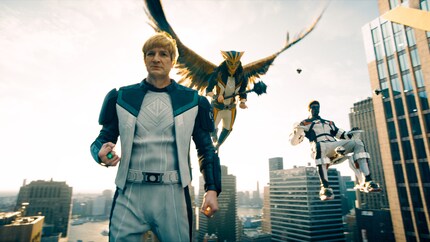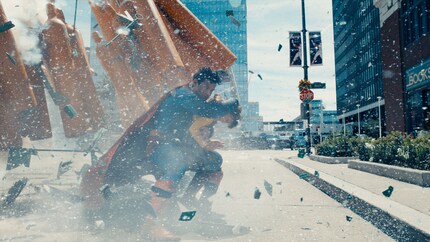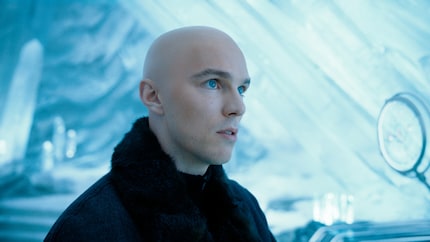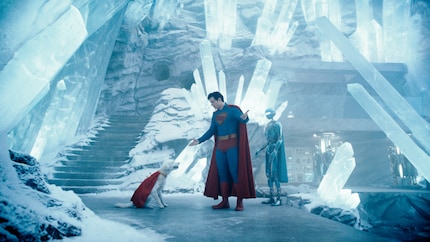
Review
The Running Man: entertainment instead of alarm bells
by Luca Fontana

James Gunn was supposed to breathe new life into the superhero genre. But his Superman remains surprisingly well-behaved. Instead of courage and vision, we get passable entertainment – and a director who holds back with the most important hero of all.
Don’t panic, this movie review contains no spoilers. Everything mentioned here has already been revealed in trailers. Superman is in cinemas from 10 July.
I wanted this movie to make an entrance. I wanted it to hit me hard, surprise me and move me – or at least make me angry. Something. Not leave me shrugging my shoulders.
Because James Gunn isn’t just anyone. He’s the director who’s given a talking raccoon more emotional depth than many an Oscar-winning drama. With Peacemaker, he created one of the most biting, courageous and at the same time most vulnerable superhero series. And now he has the opportunity to relaunch a DC universe that was thought to be dead: with Superman.
However, this beginning doesn’t feel exciting, but rather like a compromise. As if Gunn had clipped his own wings – on the man who can fly, of all people.
There’s no doubt about it, Superman is more than just a Superhero. He’s an idea. An archetype. The moral fixed star of an entire genre. Where Batman reflects the darkness within us, Superman’s the light that we never reach – but should always strive for. He’s hope. Mercy. Untouchable. And that’s exactly what makes it so damn hard to tell.
James Gunn gives it a try anyway. But instead of slowly introducing us to this new Superman, he throws us into the middle of the new DC Universe – the DCU – without warning. In his world, so-called metahumans have been established for centuries and are part of everyday life. Superman, meanwhile, has been on Earth for three decades and has just lost his first battle.
Why now? Against who? No time for questions. As soon as the man of steel staggers to the ground, the next attack begins. And another one. And another one.
It’s as if Gunn was afraid we’d lose interest if it didn’t start with a loud bang. So he plunges us from one action set piece into the next before we even realise what rules actually apply in this new DCU. Who plays what role here. Who’s friend and who’s enemy.
What should carry us emotionally and what’s just filler.
It’s not a bad approach. But instead of concentrating on the essentials, Gunn doesn’t start by sprinkling it on, he lays the whole thing on us at once. Because the new Superman doesn’t just fly into Metropolis. He intervenes in an international conflict between two fictitious nations: Jarhanpur and Boravia. The parallels to real-world events are ridiculously clichéd, but obvious and therefore generic. So much so, in fact, that any real stance fizzles out right from the start.
And as soon as one scene’s over, the next puzzle in global worldbuilding stacks up like a house of cards that could crumble at the slightest whiff. Of course, building a new world without exposition, but with speed – that has charm. But everything seems rushed here. Like a summary of all the set pieces from a series we’ve never seen.

A few of these set pieces? A Green Lantern, Hawkgirl, Superdog, black holes, pocket universes, interdimensional blops, Kaijus, a shapeshifter with a green baby. Plus Lex Luthor, who’s sometimes an ice-cold strategist, sometimes a choleric tech-bro. All this happens within the first 60 minutes of the movie. And in the middle of it all is Superman – played nicely but not particularly charismatically by David Corenswet. There’s not really a moment for him to reflect on who he is anyway: he constantly has to save something or someone. Or fight.
It’s true, a lot of this is exciting. Individual scenes are exhilarating, individual ideas flash. For example, when Lois Lane – very well played by Rachel Brosnahan – asks Clark Kent alias Superman for an interview. What begins as a harmless encounter soon turns out to be a little power play: she wants more than just empty words. She wants to find out how much calculation is really behind Superman’s flawless façade. For a moment, his perfect moral front actually begins to crack. Finally Superman comes across as a real figure and not just a symbol.

But these moments disappear as quickly as they come. The movie rushes from one set piece to the next without allowing anything to settle. And without Superman – the most iconic of all characters – ever really settling in the new world that’s being built.
Then there’s Lex Luthor, the biggest ache in my side in this movie. He’s said to be the smartest person in the world. A string-puller, a strategist, a man who topples empires from the shadows – that’s how we know him. And want him.
But in James Gunn’s version, he often comes across as the opposite: agitated, loud, highly strung. Most of the time he’s barking orders from a high-tech command centre. And when he’s not doing that, he rails against Superman like a bad-tempered Reddit user with fantasies of world domination. There’s little sign of the stoic brilliance that is usually inherent in this character. Kevin Spacey, for example, perfectly pulled off the sadistic understatement in Superman Returns. Michael Rosenbaum also pulled it off in Smallville with controlled, insidious manipulation.

Nicholas Hoult’s Lex comes across as though he’d need to convince himself that he really is the smartest in the room. His masterplan? A confusing construct of propaganda, framing and military armament. Yet in the end it only works because a crucial piece of the puzzle falls into his lap – a secret about Superman that finally makes his entire campaign seem plausible.
But therein lies the problem: Luthor’s brilliant plan would’ve simply come to nothing without this coincidence. The fact that the «smartest man in the world», of all people, hasn’t figured out the most important leverage himself, but receives it via audio tape – not only weakens his authority, but also the script.
This doesn’t make his character appear dangerous, but overambitious. And the movie fails to make him the kind of antagonist who really challenges Superman: intellectually, morally, ideologically. Instead, Luthor merely remains a loud opponent in a loud movie. Yawn.
Oh, James Gunn… as the new boss of DC Studios, he could choose who laid the foundation for the new DCU and, with that, chose himself. He’s never had more creative control. No old studio ties to hold on to. No elaborate universe he had to live up to. And certainly no Kevin Feige breathing down his neck. Yet, the movie seems to be more scared of letting go than ever before.
Perhaps because the things they kept a tight hold on weren’t visible. Because they consisted of expectations – the expectations of fans, the studio and not least his own? Gunn’s aware that Superman isn’t a niche project like Guardians of the Galaxy or Peacemaker. Superman isn’t just a cult figure. Superman’s the symbol of an entire genre – and Gunn seems to be falling apart because of it.
He wants to do justice to the myth, which is precisely why he seems so strangely inhibited. As if he shouldn’t be the Gunn who shot himself into the heart of chaos with exploding heads, tentacle monsters and tragic-comic losers in The Suicide Squad. He was allowed to do anything back then. And that’s exactly why he created something real – in the dustbin of DC film history, of all places.
Here, on the other hand, every urge to cross boundaries seems to be muted, every breach of taboo held back. Instead of a radical vision, there’s fun, smiles and harmless one-liners.
This Superman also tries to wrestle with himself. It raises questions about belonging, responsibility and moral integrity. But they come late – and are quickly moved away from. The father-son scenes on the Kent farm, which are supposed to anchor this conflict emotionally, seem like an afterthought. Introduced too late, hardly any build-up, and just handed over to us.
Even Superman’s origin, a central element of every incarnation of this character, remains strangely undecided here. There’s a moment when the movie hints at turning this myth on its head. A new reading, a courageous reinterpretation. But instead of really exploring them, Gunn pushes them aside surprisingly quickly – as if he was hesitant to take this step himself. It’s as if Gunn kept stopping when he was writing and asking himself – am I really allowed to do this? Is that what people want?
Will they react well to my ideas – and in a Superman movie?

That’s exactly the problem. Because if James Gunn, of all people, no longer dares to be uncomfortable, all that remains is a movie that entertains. In my case, it left me feeling strangely empty.
In the end, Superman isn’t a bad film. It’s entertaining, funny in places, visually appealing and – perhaps most importantly – finally upbeat again. After all the heavy gloom of earlier takes on Superman, this movie feels like a stroke of liberation. One that says hope can tread quietly.
Nevertheless, you’re left feeling flat. Not because the film alone falls flat, but because it falls short of what James Gunn is capable of. He often veers off too soon when he could have had the courage to head straight on. And because Gunn chose his limits, even though no one imposed them on him.
Maybe I just went into it with too high expectations. Expectations set by James Gunn himself with the standard of his previous work. Superman isn’t brave, or well-rounded or radical. However, it’s not insignificant either. In the midst of the brute force, there are always brief moments in which the movie hints at what could’ve been possible. Yet, there’s not a single second I find boring in this Superman.
I write about technology as if it were cinema, and about films as if they were real life. Between bits and blockbusters, I’m after stories that move people, not just generate clicks. And yes – sometimes I listen to film scores louder than I probably should.
Which films, shows, books, games or board games are genuinely great? Recommendations from our personal experience.
Show all